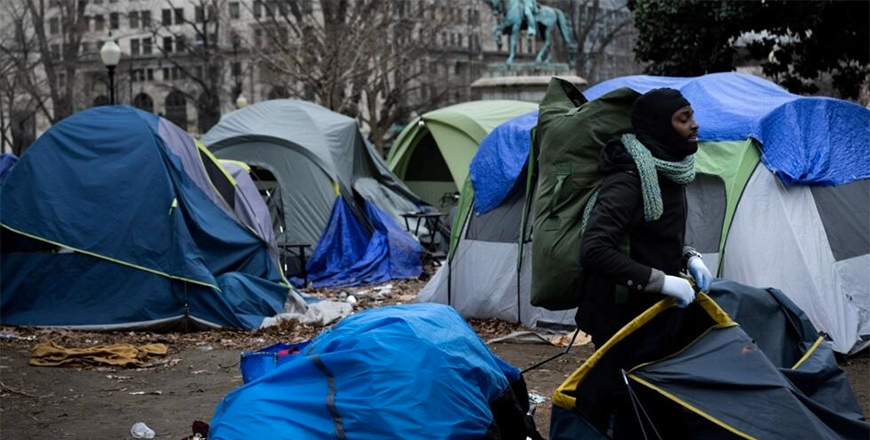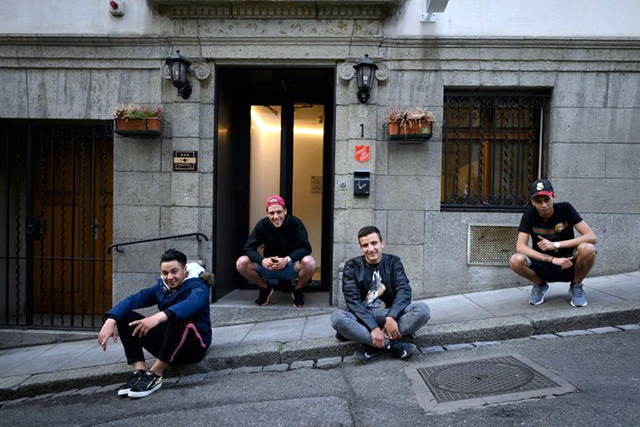You are here
US Supreme Court weighs ban on homeless people sleeping outside
By AFP - Apr 23,2024 - Last updated at Apr 23,2024

The Supreme Court’s ruling could have wide-ranging impacts as cities across the United States deal with homeless encampments in public spaces (AFP photo)
WASHINGTON — The US Supreme Court heard arguments on Monday on whether cities can ban homeless people from sleeping outside, as the country grapples with increasing rates of Americans living on the streets and a lack of shelter beds.
The case centres around regulations in the city of Grants Pass, in the western state of Oregon, which banned camping or using any kind of bedding on public property after its public parks became filled with tents, blankets and cardboard.
Those breaking the rules face hundred-dollar fines and possible prison sentences for repeat offenders.
Homeless advocates have argued that banning people from camping when there is nowhere else to sleep amounts to “cruel and unusual punishment” — prohibited by the US Constitution’s Eighth Amendment.
The decision of the nine Supreme Court justices, expected by June 30, could carry high stakes. A record 653,100 people are homeless across the country, according to a 2023 count.
“The ordinances by design make it physically impossible for homeless people to live in Grants Pass without facing endless fines and jail time,” Kelsi Corkran, a lawyer arguing against the ban, told the Supreme Court on Monday.
Corkran added that the ban turns “the city’s homelessness problem into someone else’s problem by forcing its homeless residents into other jurisdictions”.
Theane Evangelis, lawyer for Grants Pass, defended the city’s punishments as “not in any way unusual”.
“This court should reverse and end the Ninth Circuit’s failed experiment,” Evangelis told the justices, referring to the appellate court which in 2022 blocked the city’s regulations.
Evangelis said the 2022 ruling had “fuelled the spread of encampments while harming those it purports to protect”.
Grants Pass, population 40,000, does not have a municipal homeless shelter and instead relies on private charities.
Asked by Chief Justice John Roberts what the city would do if its appeal failed at the Supreme Court, Evangelis said its “hands will be tied”.
“It will be forced to surrender its public spaces,” she added.
Roberts said that the city’s ban was not necessarily a criminalization of homeless “status” since this could change, and instead was about “conduct”.
“You can remove the homeless status in an instant if you move to a shelter or situations otherwise change and of course it can be moved the other way as well if you’re kicked out of the shelter,” Roberts said.
Elena Kagan, one of three liberal justices on the conservative-dominated bench, reproached the city authorities for criminalising a “biological necessity”.
“You could say breathing is conduct too, but presumably, you would not think that it’s okay to criminalise breathing in public. And for a homeless person who has no place to go, sleeping in public is kind of like breathing in public.”
In addition to poverty, drug addiction and a lack of shelter beds propelling homelessness, economists argue the country’s market-rate housing stock is woefully behind target — leaving the United States short of millions of homes needed to meet demand and increasing prices for existing housing.
Related Articles
NEW YORK — Life on the streets of New York may be miserable for the thousands of homeless who sleep rough, but many are disillusioned by ste
NEW DELHI — India’s capital New Delhi is shivering through an unusually harsh bout of winter cold, blamed for killing scores of homeless peo
GENEVA — Sofiane Rahmani can hardly believe his luck.
















